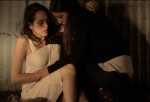June 2012 was an especially busy time for UCLA alumna Michelle Farivar, who had a lot more on her mind than preparing to don a cap and gown. In between the excitement of her graduation ceremonies, she also had to shoot the remaining scenes of her first starring role in the dramatic and controversial feature film “Virginity.”
“Virginity,” written and directed by Saeed Khoze, is based on true events and discusses the issues of honor killings, rape, prostitution and sexual trafficking around the world.
The film traces the emotional stories of its three female protagonists – an Iranian woman named Raha played by Farivar, a European woman called Jassmin played by Jessica Hendrickson and a Russian woman called Natasha played by Vera Nova.
In the film, Raha is forced into an arranged marriage and her life is at risk if she rejects the marriage. She is later befriended by Hendrickson’s character as the story unfolds.
After making its way through several festivals earlier this year, including the Boston International Film Festival and the Other Venice Film Festival, “Virginity” premieres April 21 at the Los Angeles New Wave International Film Festival.
Farivar, who, like Raha, is of Iranian descent, said this was her first time working on a film that deals with such a sensitive and controversial subject. After she met with Khoze, the two agreed she should audition for the movie.
“He started telling me the stories that prompted him to make this film, and I was so moved that I just started crying,” Farivar said. “I couldn’t believe that these kinds of things existed or were happening.”
The honor killings explored in this film are based on accounts of women who have been murdered, often by relatives, as punishment for behavior that is deemed as bringing dishonor to the family.
According to the United Nations, honor killings often involve the murder of women whose relatives believe that their chastity has been violated. These include victims of rape, women suspected of having premarital sex and women accused of adultery. The United Nations estimates that as many as 5,000 women are victims of these killings each year.
One of the challenges Farivar said she encountered was the extreme difficulty of some of the parts she had to shoot, which included scenes of rape. Farivar also said she had nightmares after starting to shoot some of the most challenging scenes.
“It was such a heavy topic to begin with, it was very scary to take on those things,” Farivar said.
Hendrickson also said filming this movie was an extremely emotional experience for her.
“It was pretty gut-wrenching,” Hendrickson said. “My last day of filming, there was a scene where (Farivar) is in a compromising position, and I basically had to be upset for the camera. It had all culminated to this moment … and as soon as (Khoze) called ‘cut’ I broke down into tears, and I cried for two hours straight.”
This film was also a learning opportunity for some of the cast members. Farivar said she was aware of the injustices toward women in the Middle East, but not to the extent as exposed in the film.
Both Farivar and Khoze emphasized that “Virginity” is not an anti-Iranian film, but rather it seeks to give voice to the innocent victims of such actions.
“I love my culture – it has nothing to do with that,” Farivar said. “I think the main thing about it is trying to understand that it’s not about Iran. It’s not about any particular country or religion, though it happens to be predominantly happening in Muslim communities. … It’s about a worldwide thing.”
It is precisely this type of poignant response that Khoze said he hopes to provoke within audiences in order to call attention to the atrocity of honor killings. After the trailer for the film was released, it was heavily criticized because of its subject matter, and the film has even been banned in Iran, but Khoze said “Virginity” sends an important message about human rights.
“It’s real. It’s not a fantasy movie. There is nothing fake,” Khoze said. “When you try to show something that’s wrong about a culture, it’s hard because there is a lot criticism, but a lot of people will support you.”
Despite this criticism, Hendrickson said one of the most rewarding aspects of working on “Virginity” is that it introduces viewers to an issue that they may not have known about at all.
“I know not everybody’s behind us in the world,” Hendrickson said. “(But) if we can save one life (by) making this movie, then we’ll have done our jobs.”
